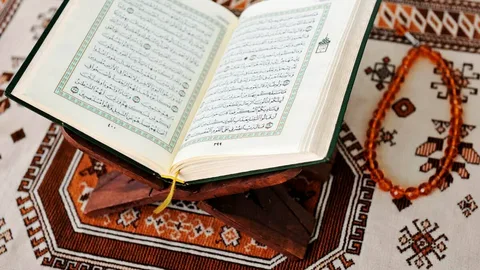The Quran, revered as the holy book of Islam, holds a central place in the lives of Muslims worldwide. It is considered the literal word of God, revealed to the Prophet Muhammad (peace be upon him) over 1,400 years ago. However, one of the most debated questions is whether can the quran be translated. This question arises from the Quran’s original revelation in Classical Arabic—a language rich in meaning and nuance. Understanding the Quran is vital for Muslims, but not all are fluent in Arabic, leading to a reliance on translations. But can a translation ever fully capture the essence of the Quran?
What Is the Quran?

The Quran is not just a book; it is the foundation of the Islamic faith. Muslims believe it is the final revelation from God, following previous scriptures like the Torah and the Bible. The Quran serves as a guide for all aspects of life, from spirituality to law and ethics.
Language of the Quran: Classical Arabic
The Quran was revealed in Classical Arabic, a language known for its depth and precision. Arabic is not just a medium of communication but a significant part of the Quran’s message. The structure, rhythm, and choice of words in the Quran are considered miraculous and inimitable, making translation a complex task.
The Quran’s Role in Islamic Faith and Practice
For Muslims, the Quran is more than a text; it is a living guide. Its verses are recited in daily prayers, memorized by millions, and studied in detail to understand the principles of Islam. The Quran is also recited in its original Arabic during religious ceremonies, emphasizing its sacredness.
The Importance of Understanding the Quran
Understanding the Quran is crucial for Muslims, as it connects them with their Creator. The Quran offers guidance, comfort, and wisdom, helping believers navigate the challenges of life. It also provides the foundation for Islamic beliefs and practices.
The Role of the Quran in Daily Life
The Quran is not just read; it is lived. Muslims turn to the Quran for guidance in matters of faith, morality, and even daily decisions. The Quran’s teachings influence every aspect of a Muslim’s life, making its understanding essential.
Challenges for Non-Arabic Speakers
While Arabic-speaking Muslims can directly engage with the Quran, those who do not speak the language face challenges. For them, translation becomes a necessity. However, the question remains: can a translation convey the full depth of the Quran’s message?
Read more: how big is the quran
Can the Quran Be Translated?

Translating the Quran is not just about converting words from one language to another. It involves capturing the meaning, tone, and spiritual essence of the original text. The rich layers of meaning in Arabic, including wordplay, alliteration, and rhythm, pose significant challenges for translators.
Theological Implications of Translation
From a theological perspective, many scholars argue that the Quran, being the word of God, is untranslatable. They believe that any translation is merely an interpretation, reflecting the translator’s understanding rather than the actual divine message. This distinction is critical in Islamic thought.
The Concept of “Interpretation” vs. “Translation”
Due to the complexities of translating the Quran, many prefer to refer to translations as “interpretations.” This acknowledges that a translation may not fully capture the Quran’s original meaning and that understanding the Quran requires more than just reading its translation.
Historical Perspective on Quran Translations
The history of Quran translation dates back centuries, with early translations appearing in Persian, Latin, and other languages. However, these early efforts were often met with resistance, as many scholars believed that the Quran should only be read in its original Arabic.
Key Historical Translations and Their Impact
Over time, several key translations have shaped the way the Quran is understood by non-Arabic speakers. For example, the first complete English translation by George Sale in 1734 played a significant role in introducing the Quran to the Western world. However, these translations also sparked debates about accuracy and interpretation.
Modern Translations and Their Acceptance
Today, there are numerous translations of the Quran in various languages, each with its own approach and style. While some translations are widely accepted, others are viewed with skepticism, highlighting the ongoing debate over the translatability of the Quran.
Read about: beautiful passages from the quran
The Debate Among Scholars
Proponents of Quran translation argue that making the Quran accessible to non-Arabic speakers is essential for spreading its message. They believe that translation helps Muslims who do not speak Arabic connect with their faith and enables non-Muslims to understand Islam better.
Arguments Against Translating the Quran
On the other hand, opponents argue that translating the Quran can lead to misinterpretations and loss of meaning. They stress that the Quran’s divine nature is intrinsically linked to its Arabic language, and any attempt to translate it inevitably falls short.
The Middle Ground: Translations as Interpretations
Many scholars find a middle ground by accepting translations as useful tools for understanding the Quran while emphasizing that they are not replacements for the original Arabic text. This perspective allows for the use of translations in education and outreach, without compromising the Quran’s sanctity.
Popular Translations of the Quran
Some of the most popular translations include Abdullah Yusuf Ali’s translation, the Saheeh International translation, and Muhammad Asad’s “The Message of the Qur’an.” Each translation has its own strengths and weaknesses, reflecting the translator’s approach and audience.
Differences Among Translations
No two translations of the Quran are identical. Differences in language, cultural context, and theological perspective lead to variations in how the Quran is rendered in other languages. These differences can significantly impact the reader’s understanding of the Quran.
Choosing the Right Translation for Study
When selecting a Quran translation, it is important to consider the translator’s background, approach, and the purpose of the translation. Reading multiple translations can provide a more comprehensive understanding of the Quran’s message.
The Impact of Translation on Understanding the Quran
Translation inevitably influences interpretation. A translator’s choices in wording, phrasing, and emphasis can shape how readers understand the Quran. This underscores the importance of reading translations critically and being aware of their limitations.
The Role of Cultural Context in Translation
Cultural context plays a significant role in translation. The Quran’s message, which was revealed in a specific historical and cultural context, may be interpreted differently when translated into another language. Understanding this context is key to grasping the full meaning of the Quran.
The Potential for Misinterpretation
While translations make the Quran accessible, they also open the door to misinterpretation. Without a strong foundation in Islamic teachings, readers may misunderstand or misapply the Quran’s message. This highlights the need for careful study and guidance when reading translated texts.
Translation and Accessibility
Translations play a crucial role in making the Quran accessible to Muslims who do not speak Arabic. They enable millions of people to engage with the Quran’s teachings and incorporate them into their daily lives.
The Role of Translation in Dawah (Islamic Outreach)
In the context of dawah, or Islamic outreach, translations of the Quran are invaluable. They allow non-Muslims to learn about Islam and its teachings, fostering greater understanding and dialogue between cultures.
Online Resources and Digital Translations
With the rise of digital technology, accessing Quran translations has become easier than ever. Numerous websites and apps offer translations in multiple languages, along with tools for studying and comparing different versions.
FAQs
Why is the Quran difficult to translate?
The Quran is difficult to translate due to the complexity and richness of the Arabic language, as well as the spiritual and theological depth of its content.
Are translations of the Quran considered equal to the original?
No, translations are generally considered interpretations and are not viewed as equal to the original Arabic text, which is believed to be the literal word of God.
Which translation of the Quran is the most accurate?
There is no single “most accurate” translation; it depends on the translator's approach and the reader’s needs. It is often recommended to read multiple translations for a broader understanding.
Can non-Muslims read the Quran in translation?
Yes, non-Muslims can read the Quran in translation, and many do so to learn about Islam. However, it is important to approach the text with respect and an open mind.
How can I choose the best translation of the Quran?
To choose the best translation, consider the translator's background, the purpose of the translation, and whether the language and style resonate with you. Consulting multiple translations and seeking advice from knowledgeable individuals can also be helpful.
Conclusion
The question of whether the Quran can be translated is complex and multifaceted. While translations can never fully capture the Quran’s original meaning, they play a vital role in making its message accessible to a global audience. By recognizing translations as interpretations and approaching them with care, Muslims and non-Muslims alike can benefit from the Quran’s timeless wisdom. Exploring multiple translations and seeking guidance from knowledgeable sources can enhance one’s understanding of the Quran and its teachings.


